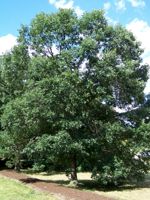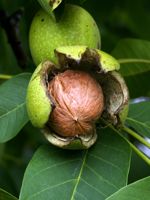Mon-Fri 9am - 5pm Mountain time
Carpathian English Walnut vs Swamp White Oak
Quercus bicolor
Juglans regia Carpathian
NOT AVAILABLE THIS SEASON - MIGHT RETURN
NOT AVAILABLE THIS SEASON - MIGHT RETURN
The Swamp White Oak is a medium-sized deciduous tree native to North America. It is commonly found in swamps, lowlands, floodplains, and near streams and lakes. The leaves are two-toned, green on top and silvery-white on the undersides, adding to the visual appeal of this popular shade tree.
In the fall, the Swamp White Oak produces acorns which are an important food source for wildlife. It also provides a habitat for the larvae of many butterfly and moth species, playing an important ecological role. Although its growth is slow in the first few years, once the roots are established, it can achieve faster annual growth.
Carpathian English Walnut is a great shade tree or a fantastic addition to a food garden. The taste is described as having a full flavour with a hint of sweetness and butterscotch. They are great for fresh eating, cooking, and baking. Thin shelled nuts split right down the center, making them easy to crack. Harvest ranges from late September to early October.
It is known for being highly productive and more cold hardy than other English Walnut varieties.
Carpathian English Walnut is considered to be self pollinating but planting with a second variety will result in greater yields. It can be cross pollinated with Black Walnut and others.
Swamp White Oak Quick Facts
Carpathian English Walnut Quick Facts
Toxicity: mildly toxic to humans, cats, and dogs

